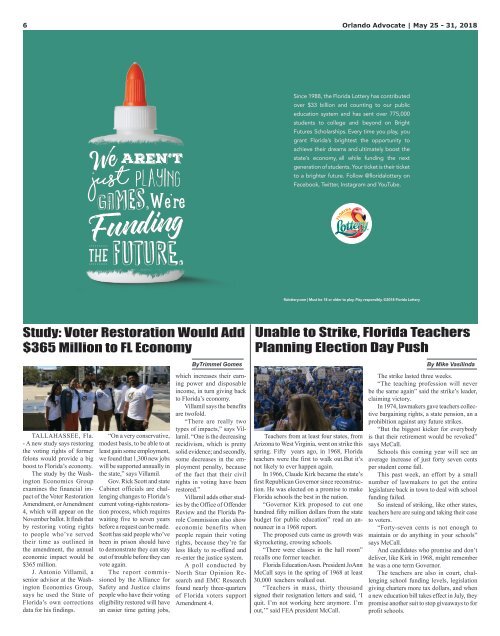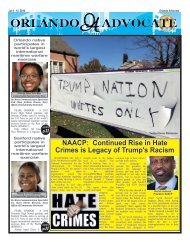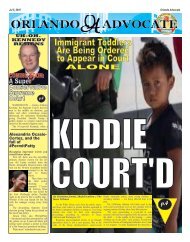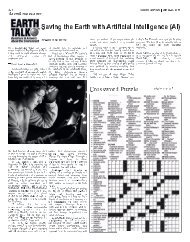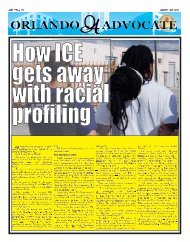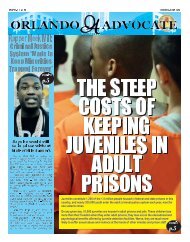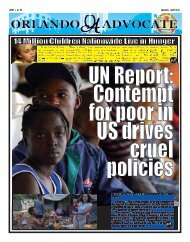2018-06-01
You also want an ePaper? Increase the reach of your titles
YUMPU automatically turns print PDFs into web optimized ePapers that Google loves.
6<br />
Orlando Advocate | May 25 - 31, <strong>2<strong>01</strong>8</strong><br />
Since 1988, the Florida Lottery has contributed<br />
over $33 billion and counting to our public<br />
education system and has sent over 775,000<br />
students to college and beyond on Bright<br />
Futures Scholarships. Every time you play, you<br />
grant Florida’s brightest the opportunity to<br />
achieve their dreams and ultimately boost the<br />
state’s economy, all while funding the next<br />
generation of students. Your ticket is their ticket<br />
<br />
Facebook, Twitter, Instagram and YouTube.<br />
<br />
Study: Voter Restoration Would Add<br />
$365 Million to FL Economy<br />
Unable to Strike, Florida Teachers<br />
Planning Election Day Push<br />
ByTrimmel Gomes<br />
By Mike Vasilinda<br />
TALLAHASSEE, Fla.<br />
- A new study says restoring<br />
the voting rights of former<br />
felons would provide a big<br />
boost to Florida’s economy.<br />
The study by the Washington<br />
Economics Group<br />
examines the financial impact<br />
of the Voter Restoration<br />
Amendment, or Amendment<br />
4, which will appear on the<br />
November ballot. It finds that<br />
by restoring voting rights<br />
to people who’ve served<br />
their time as outlined in<br />
the amendment, the annual<br />
economic impact would be<br />
$365 million.<br />
J. Antonio Villamil, a<br />
senior advisor at the Washington<br />
Economics Group,<br />
says he used the State of<br />
Florida’s own corrections<br />
data for his findings.<br />
“On a very conservative,<br />
modest basis, to be able to at<br />
least gain some employment,<br />
we found that 1,300 new jobs<br />
will be supported annually in<br />
the state,” says Villamil.<br />
Gov. Rick Scott and state<br />
Cabinet officials are challenging<br />
changes to Florida’s<br />
current voting-rights restoration<br />
process, which requires<br />
waiting five to seven years<br />
before a request can be made.<br />
Scott has said people who’ve<br />
been in prison should have<br />
to demonstrate they can stay<br />
out of trouble before they can<br />
vote again.<br />
The report commissioned<br />
by the Alliance for<br />
Safety and Justice claims<br />
people who have their voting<br />
eligibility restored will have<br />
an easier time getting jobs,<br />
which increases their earning<br />
power and disposable<br />
income, in turn giving back<br />
to Florida’s economy.<br />
Villamil says the benefits<br />
are twofold.<br />
“There are really two<br />
types of impacts,” says Villamil.<br />
“One is the decreasing<br />
recidivism, which is pretty<br />
solid evidence; and secondly,<br />
some decreases in the employment<br />
penalty, because<br />
of the fact that their civil<br />
rights in voting have been<br />
restored.”<br />
Villamil adds other studies<br />
by the Office of Offender<br />
Review and the Florida Parole<br />
Commission also show<br />
economic benefits when<br />
people regain their voting<br />
rights, because they’re far<br />
less likely to re-offend and<br />
re-enter the justice system.<br />
A poll conducted by<br />
North Star Opinion Research<br />
and EMC Research<br />
found nearly three-quarters<br />
of Florida voters support<br />
Amendment 4.<br />
Teachers from at least four states, from<br />
Arizona to West Virginia, went on strike this<br />
spring. Fifty years ago, in 1968, Florida<br />
teachers were the first to walk out.But it’s<br />
not likely to ever happen again.<br />
In 1966, Claude Kirk became the state’s<br />
first Republican Governor since reconstruction.<br />
He was elected on a promise to make<br />
Florida schools the best in the nation.<br />
“Governor Kirk proposed to cut one<br />
hundred fifty million dollars from the state<br />
budget for public education” read an announcer<br />
in a 1968 report.<br />
The proposed cuts came as growth was<br />
skyrocketing, crowing schools.<br />
“There were classes in the hall room”<br />
recalls one former teacher.<br />
Florida Education Assn. President JoAnn<br />
McCall says in the spring of 1968 at least<br />
30,000 teachers walked out.<br />
“Teachers in mass, thirty thousand<br />
signed their resignation letters and said, ‘I<br />
quit. I’m not working here anymore. I’m<br />
out,’” said FEA president McCall.<br />
The strike lasted three weeks.<br />
“The teaching profession will never<br />
be the same again” said the strike’s leader,<br />
claiming victory.<br />
In 1974, lawmakers gave teachers collective<br />
bargaining rights, a state pension, an a<br />
prohibition against any future strikes.<br />
“But the biggest kicker for everybody<br />
is that their retirement would be revoked”<br />
says McCall.<br />
Schools this coming year will see an<br />
average increase of just forty seven cents<br />
per student come fall.<br />
This past week, an effort by a small<br />
number of lawmakers to get the entire<br />
legislature back in town to deal with school<br />
funding failed.<br />
So instead of striking, like other states,<br />
teachers here are suing and taking their case<br />
to voters.<br />
“Forty-seven cents is not enough to<br />
maintain or do anything in your schools”<br />
says McCall.<br />
And candidates who promise and don’t<br />
deliver, like Kirk in 1968, might remember<br />
he was a one term Governor.<br />
The teachers are also in court, challenging<br />
school funding levels, legislation<br />
giving charters more tax dollars, and when<br />
a new education bill takes effect in July, they<br />
promise another suit to stop giveaways to for<br />
profit schools.


